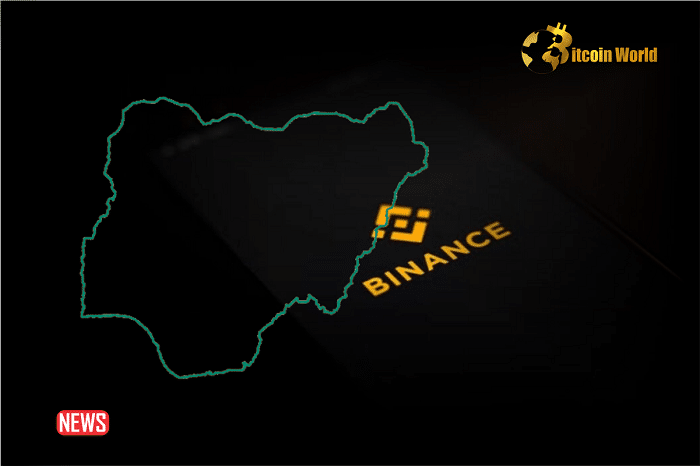Hold onto your hats, crypto enthusiasts! The Nigerian government has just dropped a bombshell on Binance, the world’s leading cryptocurrency exchange. Imagine a fine so large it makes your eyes water – we’re talking a staggering $10 billion! Why such a massive penalty? Nigeria is accusing Binance of some serious economic damage, alleging the platform’s actions have led to a dramatic plunge in the value of the Naira and destabilized the nation’s economy. Let’s dive into this developing story and unpack what it means for Binance, Nigeria, and the wider crypto world.
Why is Nigeria Demanding a $10 Billion Fine From Binance?
The heart of the matter lies in Nigeria’s claim that Binance has been manipulating exchange rates, causing significant financial turmoil in the country. Here’s a breakdown of the key allegations:
- Exchange Rate Manipulation: Nigeria asserts that Binance illegally set exchange rates, undermining the Central Bank of Nigeria’s (CBN) authority as the sole entity legally permitted to do so.
- Naira Devaluation: The government claims Binance’s activities contributed to a near 70% drop in the Naira’s value. This drastic devaluation has had a ripple effect across the Nigerian economy, impacting businesses and individuals alike.
- Economic Destabilization: President Bola Tinubu’s spokesperson, Bayo Onanuga, has been vocal about the negative impact, stating Binance’s actions have hampered efforts to stabilize the Nigerian economy.
To put it bluntly, Nigeria is holding Binance accountable for allegedly exacerbating the country’s economic woes. According to Onanuga, Binance’s unauthorized exchange rate settings are not just violations but are considered illegal, directly contradicting the CBN’s mandate.

See Also: Nigerian Authorities Detained Two Binance Executives Amid Naira Speculation Crackdown
Arrested Executives: What’s the Latest?
The situation took a dramatic turn with the arrest of two Binance executives in Nigeria. This wasn’t just a slap on the wrist; it signaled a serious escalation. Here’s what we know about the arrests:
- Detention and Interrogation: Nigerian authorities confirmed the arrest of two foreign Binance executives. They are currently being interrogated by security agencies.
- Serious Allegations: The allegations go beyond exchange rate manipulation. Binance is being investigated for potential involvement in money laundering and terrorism financing.
- Massive Cryptocurrency Flows: CBN Governor Olayemi Cardoso revealed that a staggering $26 billion flowed through Binance Nigeria in cryptocurrency trades. Concerns are mounting over the lack of transparency and the inability to identify the sources and users behind many of these transactions.
Despite the gravity of the situation, there’s a glimmer of cooperation. Onanuga mentioned that Binance staff are reportedly cooperating with the Nigerian government, providing information to aid the investigation. This cooperation could be crucial in determining the future of Binance’s operations in Nigeria and the outcome of the government’s demands.
See Also: Nigerian Presidential Adviser, Bayo Onanuga, Calls For Measures Against Binance Crypto Exchange
Unregistered and Under Fire: Binance’s Legal Status in Nigeria
A key point of contention is Binance’s legal standing in Nigeria. Are Binance and other crypto platforms operating within the bounds of Nigerian law? The answer, according to the government, seems to be no.
- Unregistered Entities: Nigeria claims Binance and similar cryptocurrency companies have not registered in accordance with Nigerian laws.
- Regulatory Ambiguity: While Nigeria lifted the ban on cryptocurrencies in 2023, the requirement for registration with the Security Exchange Commission (SEC) for legal operation remains. It appears Binance has not fulfilled this requirement.
- Past Warnings: As far back as 2021, the former CBN governor, Godwin Emefiele, stated that cryptocurrencies would not be accepted until they complied with local regulations. This indicates a long-standing regulatory concern.
Binance Responds: Naira Trading Suspended
In a move that suggests responsiveness to the Nigerian government’s pressure, Binance has taken action:
- Naira Transactions Removed: Binance has removed Naira transactions from its platform. This is a significant step and indicates an attempt to comply with at least some of Nigeria’s concerns.
- Government Insistence on Registration: Despite this move, the Nigerian government is firm. If Binance wants to operate in Nigeria, official registration is non-negotiable. Transparency and legal compliance are the demands.
What’s at Stake? Naira’s Future and Nigeria’s Economy
This isn’t just about a fine or regulatory compliance; it’s about the stability of the Nigerian economy. The government’s concerns are deeply rooted in the potential for further economic damage.
- Budgetary Impact: Nigeria’s budget was based on an exchange rate of 800 Naira to the dollar. The actual rate has significantly exceeded this, partly attributed to Binance’s activities. This discrepancy can have major implications for government finances and economic planning.
- Market Operator Warnings: Market experts are warning that the Naira could face even more severe devaluation if the government doesn’t crack down on platforms like Binance.
See Also: HSBC Hong Kong Set To Allow Asset Tokenization In 2024
Investigation Ongoing: What Happens Next?
The investigation into Binance and its executives is still unfolding. Here’s what we know about the ongoing process:
- Security Agencies Probing: Nigerian security agencies are actively investigating Binance’s activities and the regulation of the currency exchange market.
- Cooperation but No Timeframe: Zakari Mijinyawa, from the Office of the National Security Adviser, confirmed the executives are being questioned and that discussions are underway with Binance officials, who are reportedly cooperating. However, the timeline for the investigation’s conclusion and any potential agreements remains unclear.
In Conclusion: A Crypto Crackdown or Necessary Regulation?
Nigeria’s $10 billion fine demand and the investigation into Binance mark a significant moment in the ongoing debate about cryptocurrency regulation globally. Is this a necessary crackdown to protect national economies, or is it an overreach that stifles innovation? The outcome of this case will be closely watched by crypto enthusiasts, regulators, and economists alike. The stakes are high, not just for Binance and Nigeria, but for the future of cryptocurrency regulation worldwide.
Disclaimer: The information provided is not trading advice. Bitcoinworld.co.in holds no liability for any investments made based on the information provided on this page. We strongly recommend independent research and/or consultation with a qualified professional before making any investment decisions.
#Binance #WRITE2EARN
Disclaimer: The information provided is not trading advice, Bitcoinworld.co.in holds no liability for any investments made based on the information provided on this page. We strongly recommend independent research and/or consultation with a qualified professional before making any investment decisions.



